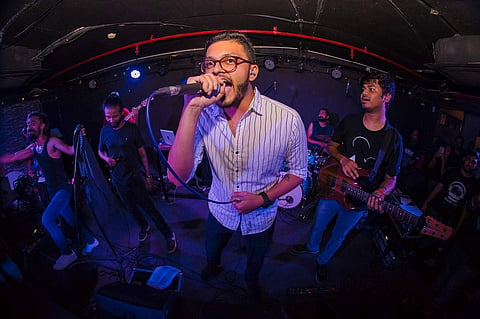
- LIFESTYLE
- FASHION
- FOOD
- ENTERTAINMENT
- EVENTS
- CULTURE
- VIDEOS
- WEB STORIES
- GALLERIES
- GADGETS
- CAR & BIKE
- SOCIETY
- TRAVEL
- NORTH EAST
- INDULGE CONNECT

Kolkata’s trustiest live music venue is in fact, housed in a multi-disciplinary growth hub, which is blazing through the way for skill-based education. The mind behind it, Meghdut RoyChowdhury, was just a teenager when he conceived Eastern India’s first state-of-the-art analog recording studio BlooperHouse Studios; a decade later, his vision to boost independent music in the city, gave way to the city’s biggest cultural mainstay, TopCat CCU. The live music venue is bringing in the most prolific line-ups and anchors Offbeat CCU, a cross-cultural environment of growth offering short-term experiential learning, co-working spaces, the city’s first backpacker’s hostel and a lot more. We caught up with RoyChowdhury to tell us about his idea that snowballed into a sustainable ecosystem.
How did you get started?
I was all of 19 years old, starry-eyed, pursuing a bachelors’ degree in computer science and engineering, with lofty ambitions in the music space. Except – I had never been a good musician. I realised that there weren’t any recording studios in the city for independent musicians to showcase their music.This gap in the market was the beginning of what is known as BlooperHouse Studios today. It started off with a bare-bones setup: a couple of mics, one basic computer in 2011, and now it has produced more than 2000 musical projects and artistes.
I was able to get a small loan from my father who himself is a first generation entrepreneur. I was able to pay him back within 9 months as we started making profits from giving out the space for album recordings, EPs, mixing and mastering sessions etc. Very soon we realised that Kolkata was craving for a studio like this, because our sound engineers were drowning in work!
How was Offbeat CCU conceptualised?
My family has been in education for over 3 decades and, and I wanted to work in the sector. The need of the hour was skill-based education and this started building Offbeat CCU which brings together hospitality (backpacker’s hostel, co-working space) education (medium-term programs delivered as workshops, bootcamps, hackathons, certifications fitness, coding, yoga, design, and entertainment), music venue like Topcat CCU. It has been quite transformative to see so many people warming up to the idea, it has almost created a tribe-like community.
How would you define TopCat CCU, especially in context of its music-first approach?
Topcat CCU started with the sole motive of giving the local talents a place they could call their own, where there would be live gigs, exhibitions, festivals and carefully curated events every day of the week. We plan to continue being the neighbourhood gastropub where you would never have to worry about listening to the same old Bollywood music and cover songs.
How do you think the listeners and audiences can help the live music scene grow?
I believe that the audience has the biggest role to play in the scheme of things. If we keep going to the same bars and clubs knowing that they will play derivative music, then we are not doing our part to keep the scene alive. Recently I came across social media posts by music lovers expressing their displeasure at the line-up of a big national music festival. This is a festival that costs thousands of rupees. But if the same listeners cared equally about what was happening in their own backyards and spent a fraction of their time, energy and money on attending local gigs, we wouldn’t have had to worry about the decline of the scene. If a city doesn’t care about its indigenous arts and music, then the scene can never grow.